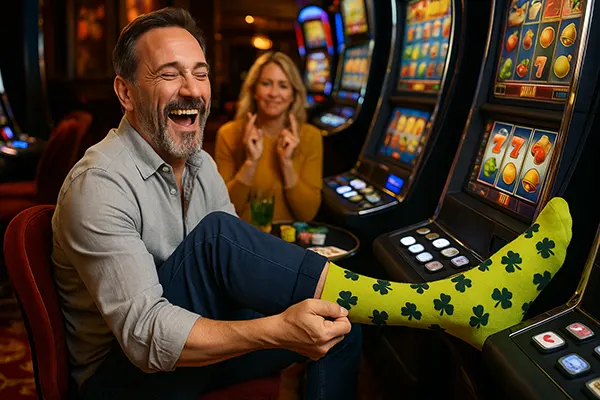The Strangest Superstitions of Casino Players: When Rituals Meet Humour

From wearing lucky socks to avoiding the number 13, casino players often adopt bizarre habits and beliefs in pursuit of success. While some of these superstitions seem rooted in tradition, others have emerged as humorous rituals unique to the world of gambling. These behaviours reflect how people try to regain a sense of control in games of chance, transforming anxiety into amusing customs that evolve into cultural quirks.
Unusual Rituals and Their Cultural Roots
Across cultures, gambling rituals often mirror long-standing beliefs about luck and fate. In China, players might enter casinos through the back door if they believe it avoids bad fortune, while some Italian gamblers avoid placing bets on Tuesdays due to the cultural belief that “Tuesday brings bad luck”. These traditions, though seemingly irrational, are passed down through generations and bring an emotional comfort.
In Las Vegas, tourists can be seen tapping slot machines before pulling the lever, convinced it brings better odds. Though the outcome is purely random, the repetitive action gives players a feeling of agency. In Eastern Europe, spitting over one’s shoulder before playing is believed to ward off bad luck—a behaviour rooted in old folklore.
Interestingly, many superstitions are now cross-cultural thanks to globalisation. Lucky charms like rabbits’ feet, four-leaf clovers, and coins from winning sessions are commonly found at gambling tables around the world. These items serve as psychological anchors, helping players feel “prepared” or “protected” before engaging with uncertainty.
Common Symbols and Their Psychological Impact
The psychology behind gambling superstitions often centres on the illusion of control. When players attribute wins or losses to specific behaviours, they form habits that become rituals. For example, wearing a particular colour or sitting at a certain table may feel like a winning formula, even if the logic is baseless.
Symbols of good fortune also play a role. For example, some players believe a horseshoe necklace helps maintain a winning streak, while others are convinced that crossing their fingers during a spin can shift the odds. Though these actions have no scientific backing, they can ease tension and help players stay focused.
In a study by the University of Nevada in 2023, researchers found that players who followed rituals reported higher enjoyment and emotional engagement during games, even if their win rates didn’t change. The comfort of ritual, it seems, has real value—even if it doesn’t affect the cards.
The Top Five Real-Life Superstitions
Among the most peculiar superstitions are real-life practices shared widely within casino communities. One notable example is the belief that never counting your chips while playing keeps luck on your side. Many gamblers follow this rule religiously, considering it disrespectful to fortune itself.
Another widespread belief involves wearing the same outfit every time one wins—often unwashed for fear of “washing away the luck”. In some cases, players go as far as labelling clothing by the type of game they’re associated with—blackjack trousers, poker shirts, and so on.
Some players also avoid touching money with their left hand before betting. In certain traditions, the left hand is associated with loss or impurity, and such beliefs carry into gambling habits. Though outdated, these superstitions continue to thrive in modern casinos.
Superstitions That Defy Logic
One extreme superstition comes from a veteran slot player in Atlantic City, who claims never to speak a word while playing or the machine will “know” and stop paying. While absurd, this belief has been echoed by others who swear silence preserves good fortune.
There’s also the curious habit of gambling only when it rains. Some players believe rain “cleanses” bad energy and boosts winning odds. While weather clearly doesn’t impact games of chance, the ritual gives players an amusing excuse to return to the tables.
Lastly, several players believe in the “rule of three”: if you win three times in a row, you must leave immediately or risk losing it all. This self-imposed limit is as much about discipline as it is superstition, yet it’s framed as an ancient, unspoken rule among gamblers.

Humour as a Coping Mechanism in Gambling
Many gamblers embrace humour as a way to navigate the emotional rollercoaster of casino life. Superstitions often serve as running jokes among friends or family. Players might wear deliberately ridiculous hats for luck or talk to their cards, creating a theatrical experience that adds levity to the high-stakes atmosphere.
In fact, some casinos even lean into these traditions, offering “lucky sock” giveaways or designating tables for “superstition night” with humorous signs encouraging players to bring their charms. These events not only draw attention but create a light-hearted environment that humanises the gambling experience.
Jokes about “cursed” dealers or haunted slot machines are commonplace and part of the folklore among frequent players. These stories, while exaggerated, contribute to a shared narrative that bonds gamblers through laughter, even during losing streaks.
When Comedy Reinforces Rituals
Over time, what starts as humour can become habitual. A player who first wears lucky socks as a joke may continue to do so out of fear of jinxing a good streak. This blend of irony and sincerity makes gambling superstitions uniquely enduring.
Some even go as far as to name their betting strategies after comedy sketches or personal mishaps, turning loss into folklore. Humour gives gamblers a way to reclaim control over outcomes they can’t influence and offers a shared language that unites them at the tables.
In the end, superstitions in casinos are less about results and more about the stories they inspire. They offer insight into how people cope with chance, luck, and uncertainty—one laugh, one ritual, and one lucky charm at a time.
